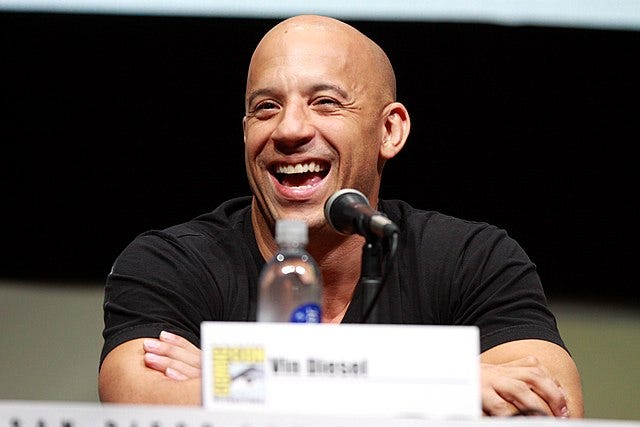
Riddick (2013) is a typical early 2010s blockbuster, one that was clearly made before the reckoning of the Me Too movement. The film’s only prominent female character is hyper-sexualized and exists primarily through the lens of Riddick’s affection, rather than having an authentic narrative of her own. This was the first thing I noticed upon watching, and it immediately stood out as something that aged poorly. If you haven’t seen the film, unfortunately, it’s even worse than I am articulating.
From an industry perspective, Riddick was an anomaly. Released during the height of Hollywood’s franchise-building frenzy, when the MCU was dominating and studios were prioritizing interconnected universes, this third installment was financed in an unconventional way. Rather than relying on a major studio’s full backing, Vin Diesel personally funded part of the film, supplementing the budget through foreign pre-sales and independent financing. This meant Riddick had a relatively modest $38 million budget but still managed to earn $98.3 million worldwide, making it a moderate financial success. David Twohy returned to direct, maintaining his creative control over the project, and home video sales (remember those?) played a major role in the film’s long-term profitability.
The best aspect of Riddick is its return to survival-horror roots. Much like Pitch Black (2000), the film utilizes night and day cycles to showcase Richard B. Riddick’s (we finally learn his full name) affinity for darkness while emphasizing the increasing reliance of other characters on his abilities. Instead of the overblown sci-fi epic that was Chronicles of Riddick (2004), this installment simplifies the formula: a group of mercenaries, convinced that Riddick is their greatest threat, soon realize that the true danger lies in the planet’s deadly creatures. As expected, the survival dynamic forces an uneasy alliance between the hunted and the hunters.
I wrote about the prior two films in this series. Check it out:
The Eyes of Riddick
From now on, Friday posts will be released between 12 p.m. and 1 p.m. This arrangement allows space between posts while offering food for thought on the weekends.
There is a subplot involving Colonel R. "Boss" Johns, played by Matt Nable, who leads one of the mercenary team and is revealed to be the father of William J. Johns, the morally dubious bounty hunter killed by Riddick in Pitch Black. This thread had potential for emotional depth, but in typical Riddick fashion, it is mostly used for one-liners. After saving Riddick in the end, Johns is rewarded with a signature Vin Diesel punchline about having more backbone than his son. It’s hard to believe that a man processing the truth about his son’s character would undergo such a transformation so quickly, but this isn’t exactly a film concerned with nuanced emotional storytelling.
Unfortunately, the second and third acts fall into generic action beats, with choppy writing and predictable set pieces. The film coasts on Diesel’s charisma—he is once again the stoic, hyper-masculine antihero that he is so often typecast as. And that brings me back to the film’s weakest point: the gender dynamics. The lone female character is flattened into a sexualized, objectified figure among a cast of hardened men, and the movie seems unaware of how exhausting this trope had already become by 2013. Watching this today, especially the way her arc concludes, is a reminder of just how necessary the Me Too movement was.
Was Riddick necessary? Probably not.
But it does serve as a decent homage to the indie success of Pitch Black and is far better than Chronicles of Riddick. Diesel and Twohy clearly enjoy revisiting this world, and given the film’s profitability, we are now on track for a fourth installment, Riddick: Furya.
Will I rush to the theater for this? Absolutely not.
Will I watch from the comfort of my home, folded into my monthly streaming bill? Absolutely.









